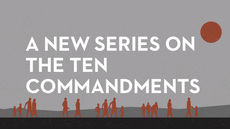Remember the Sabbath day, to keep it holy. Six days you shall labor, and do all your work, but the seventh day is a Sabbath to the Lord your God. On it you shall not do any work, you, or your son, or your daughter, your male servant, or your female servant, or your livestock, or the sojourner who is within your gates. For in six days the Lord made heaven and earth, the sea, and all that is in them, and rested on the seventh day. Therefore the Lord blessed the Sabbath day and made it holy. Exodus 20:8–11
Christians today tend to overlook how absolutely essential and central the Sabbath was for God’s people in the Old Testament. For a few thousand years, they celebrated the Sabbath with absolute devotion. Life, commerce, and worship orbited around it. It was the centerpiece of the week.
The Bible’s emphasis on the Sabbath raises all kinds of questions for Christians today. Should we observe the Sabbath? If so, on what day and in what way? How does it apply to us—if at all?
The fourth commandment is a bridge between the first three commandments (which relate to our worship of God) and the last six commandments (which relate to our worship of God as demonstrated by loving others). The fourth commandment fuses together our theological relationship with God and our social and ethical relationships with others.
The fourth commandment is about rest, but it’s also about work. God prescribes six days for work and one day for Sabbath. For 21st century Americans accustomed to the two-day weekend, six days of work may sound like a lot. But put yourself in the sandals of the ancient Israelites, who suffered under Pharaoh’s whip. Slaves don’t get a day off. If you’ve been working for four centuries straight, one day of rest in every seven sounds like welcome relief.











